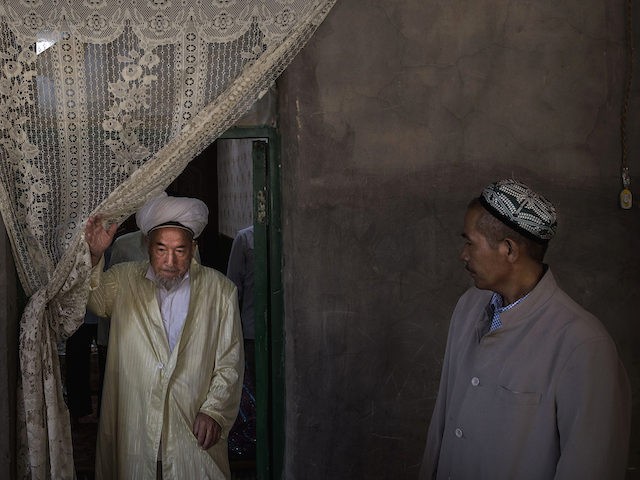Voice of America News (VOA) reported on Wednesday the Chinese Communist Party (CCP) is targeting a new Muslim community for persecution, similar to the Uyghurs of Xinjiang province: the Utsuls, a much smaller group who live primarily on the tropical resort island of Hainan.
VOA said roughly 10,000 Utsuls living in Hainan are being subjected to China’s “Sinicization of Islam” program, which essentially means using pressure tactics, intimidation, incarceration, and outright torture to “deprogram” them from their religion and teaching them to view the CCP and its dictatorial leader, Xi Jinping, as the highest authorities in the universe.
Muslim writer Gu Yi told VOA the Chinese government wants to “eliminate Islamic culture” and convert Muslim minorities into a “calm and docile Chinese group” because religious belief and cultural identity threaten the totalitarian regime in Beijing.
“They cannot tolerate groups that think differently. Therefore, they must carry out such a cultural extinction of the Islamic society,” Gu said.
VOA noted the Sinicization of Islam campaign includes “closing Islamic schools, mandating hanging the national flag at mosques, removing Islamic buildings, and replacing halal signs.” Muslims are required to register with special government agencies, and their children have been banned from studying at the few mosques China has not demolished yet. Chinese officials banned loudspeakers to prevent mosques from issuing the traditional Islamic call to prayer.
The call to prayer can still be heard in Sanya, the island city where almost all of the Utsuls live, but the New York Times noted last week that Muslim signs and posters have been covered with Chinese nationalist slogans, and the Chinese character for halal, the term for food acceptable under Islamic diets, has been stricken from restaurant advertising and menus.
The CCP claimed violent extremists were the reason Xinjiang province had to be placed under strict controls and dotted with concentration camps, but the Utsuls do not have a history of extremism or violence. Hainan province was a famed resort destination for Muslims from around the world, and the Utsuls were essentially the CCP’s goodwill ambassadors to other Islamic people. During President Joe Biden’s town hall this month, he seemingly justified China’s concentration camps, saying it is a way dictator Xi Jinping keeps the nation “unified.”
As recently as 2017, Chinese state documents described the Utsuls as a vital component of the Belt and Road Initiative, a Chinese infrastructure program that envisioned massive investments in Muslim countries to recreate the fabled Silk Road trade route.
France24 called the crackdown on the Utsuls “astonishing” to experts because they have never tried to claim independence, never presented a security threat, and show no sign of being influenced by extremist Muslim ideologies like Salafism which is associated with terror groups like Al Qaeda and the Islamic State. Chinese officials have given no clear reason for the sudden change in policy in Hainan.
The Utsul are descended from a small colony of refugees that fled wars in Vietnam and Cambodia centuries ago. Many of them also have ancestral ties to Malaysia. Their numbers are so small that the Chinese government does not officially recognize them as a distinct ethnicity, instead grouping them with the Hui, one of China’s largest ethnic groups (and another Muslim minority that is growing increasingly nervous as the oppression of the Uyghurs intensifies into genocide).
The Utsul take pride in their distinctive culture. After recovering from the brutality of the Cultural Revolution in the Sixties and Seventies, they were largely indulged by the Chinese government, especially after the Hainan tourist industry flourished around the dawn of the 21st Century.
Sanya residents – mostly speaking anonymously for fear of reprisals from the Chinese government – told VOA and the New York Times their situation began changing for the worse about two years ago, as the CCP’s crackdown on Islam spread across the country. Suddenly the Utsuls were no longer permitted to build mosques, especially if they incorporated traditional “Arab” architecture. Schools were forbidden to teach Arabic, which the Sunni Muslim Utsul employ for religious purposes. Headscarves for women were prohibited, a rule the Chinese relaxed under public protest. Police detained Utsuls who protested too vigorously.
The South China Morning Post (SCMP) in September reviewed CCP documents that discussed increasing surveillance on Utsul neighborhoods and imposing tighter restrictions on religious practice. Utsul women who work for CCP offices were told the hijab headscarf was a “disorderly” violation of dress codes. The document advised punishing CCP members who are caught practicing Islam. Conversely, every mosque in Hainan was required to have a CCP political officer on its management committee.
Associate history professor Ma Haiyun of Frostburg State University in Maryland told the SCMP that Xinjiang was a brutal “laboratory” for developing China’s repressive policies toward Muslims nationwide. Techniques perfected in Xinjiang will now be deployed against other Muslim groups, even the tiny and peaceable band of Utsuls living on their tropical resort island.
Ma warned that “beating up on this small group of 10,000 Utsuls” could inflame “anti-Chinese sentiment” in places like Malaysia and “ruin China’s image among the Southeast Asian people.” The CCP is clearly no longer worried about that possibility, perhaps confident it has enough economic leverage over key Muslim nations to manage any backlash over the “Sinicization of Islam.”
Chinese officials endlessly boast of the large number of Muslim governments who support Beijing’s brutal treatment of the Uyghurs, although a few of those Muslim nations appear to have developed second thoughts over the past two years. If the Muslim world cannot rally itself against concentration camps in Xinjiang, it is unlikely to stand up for the Utsuls as the domes disappear from their mosques and tourists have more trouble figuring out which restaurants serve halal meals.

COMMENTS
Please let us know if you're having issues with commenting.